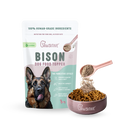Your Dogs Brain Reacts To Your Scent: Insights from the Journal of Neuroscience
Is Your Dog Dreaming About You?
Explore research by Dr. Deirdre Barrett and others to uncover how dogs relive their favorite activities and interactions with their humans in vivid dreams.
Can Dogs Tell Time?
Explore how dogs rely on circadian rhythms, routine recognition, and environmental cues to anticipate daily routines like walks and meals.
Building a Deeper Connection with Your Dog
Discover how scientific insights and fun bonding activities can help strengthen your relationship with your furry friend
Learn how research from the Journal of Neuroscience shows that a dog's brain lights up when it detects its owner's scent, strengthening their special bond.
The deep bond between dogs and humans is evident to anyone who's shared a joyful greeting or a comforting snuggle with their pet. But the scientific basis behind this connection offers even more fascinating insights. Research published in the Journal of Neuroscience highlights how a dog's brain responds to its owner's scent, revealing that dogs exhibit significant brain activity in their reward centers. This finding helps us understand the neurological foundation of the special bond between dogs and their owners.
The Study: How Dogs Process Scents
- Methodology:
The research involved training dogs to lie still inside an MRI scanner, allowing scientists to measure their brain activity as they presented various scents. The scents included the dogs' own odors, familiar humans, familiar dogs, and unfamiliar humans and dogs. - Findings:
Among all the scents tested, the smell of the dogs' owners activated the caudate nucleus—the reward center—more significantly than any other scent. This response suggests that the smell of their owners triggers a positive emotional state, possibly linked to love, safety, or a sense of belonging.
Implications of the Research:
- Recognizing and Bonding:
The study shows that dogs associate their owners with rewards and positive emotions, which are reinforced through consistent care, feeding, and affection. This research aligns with the concept that dogs perceive their owners as a source of security, affection, and leadership. - Understanding Emotional Sensitivity:
By showing how dogs recognize and respond positively to their owners' scent, the study helps explain why dogs are so emotionally sensitive to their humans. The heightened reward response strengthens the emotional bond between them.
Reinforcing a Pawsitive Life Through the Study's Findings:
- Consistent Interaction:
Dogs rely heavily on their owners' presence and consistent care. Spending quality time daily through activities like playing, training, or simply relaxing together strengthens their emotional bond, making them associate their owners with positive experiences. - Routine and Familiarity:
Dogs thrive on routine, and following a predictable schedule for feeding, walks, and playtime helps them feel secure. Familiar scents like bedding, clothing, or blankets also help reduce anxiety, especially during periods of separation. - Positive Reinforcement:
Positive reinforcement training rewards dogs with treats and praise when they follow commands or exhibit good behavior. This method not only helps establish good habits but also builds trust between dogs and their owners, reinforcing the positive association highlighted in the study. - Scent-Based Play:
Incorporate games like "find the treat," where dogs use their keen sense of smell to locate treats hidden around the house. Such scent-based play aligns with dogs' natural instincts and adds an enriching layer to their lives.
Conclusion:
The study from the Journal of Neuroscience reveals the critical role a dog's owner's scent plays in fostering their emotional well-being. By understanding these findings, owners can reinforce positive habits and activities that help their pets feel loved, secure, and mentally stimulated. Simple daily routines and rewarding interaction.
Your Dogs Brain Reacts To Your
Scent: Insights from the Journal
of Neuroscience
Learn how research from the Journal of Neuroscience shows that a dog's brain lights up when it detects its owner's scent, strengthening their special bond.
The deep bond between dogs and humans is evident to anyone who's shared a joyful greeting or a comforting snuggle with their pet. But the scientific basis behind this connection offers even more fascinating insights. Research published in the Journal of Neuroscience highlights how a dog's brain responds to its owner's scent, revealing that dogs exhibit significant brain activity in their reward centers. This finding helps us understand the neurological foundation of the special bond between dogs and their owners.
The Study: How Dogs Process Scents
- Methodology:
The research involved training dogs to lie still inside an MRI scanner, allowing scientists to measure their brain activity as they presented various scents. The scents included the dogs' own odors, familiar humans, familiar dogs, and unfamiliar humans and dogs. - Findings:
Among all the scents tested, the smell of the dogs' owners activated the caudate nucleus—the reward center—more significantly than any other scent. This response suggests that the smell of their owners triggers a positive emotional state, possibly linked to love, safety, or a sense of belonging.
Implications of the Research:
- Recognizing and Bonding:
The study shows that dogs associate their owners with rewards and positive emotions, which are reinforced through consistent care, feeding, and affection. This research aligns with the concept that dogs perceive their owners as a source of security, affection, and leadership. - Understanding Emotional Sensitivity:
By showing how dogs recognize and respond positively to their owners' scent, the study helps explain why dogs are so emotionally sensitive to their humans. The heightened reward response strengthens the emotional bond between them.
Reinforcing a Pawsitive Life Through the Study's Findings:
- Consistent Interaction:
Dogs rely heavily on their owners' presence and consistent care. Spending quality time daily through activities like playing, training, or simply relaxing together strengthens their emotional bond, making them associate their owners with positive experiences. - Routine and Familiarity:
Dogs thrive on routine, and following a predictable schedule for feeding, walks, and playtime helps them feel secure. Familiar scents like bedding, clothing, or blankets also help reduce anxiety, especially during periods of separation. - Positive Reinforcement:
Positive reinforcement training rewards dogs with treats and praise when they follow commands or exhibit good behavior. This method not only helps establish good habits but also builds trust between dogs and their owners, reinforcing the positive association highlighted in the study. - Scent-Based Play:
Incorporate games like "find the treat," where dogs use their keen sense of smell to locate treats hidden around the house. Such scent-based play aligns with dogs' natural instincts and adds an enriching layer to their lives.
Conclusion:
The study from the Journal of Neuroscience reveals the critical role a dog's owner's scent plays in fostering their emotional well-being. By understanding these findings, owners can reinforce positive habits and activities that help their pets feel loved, secure, and mentally stimulated. Simple daily routines and rewarding interaction.
recent blogs





